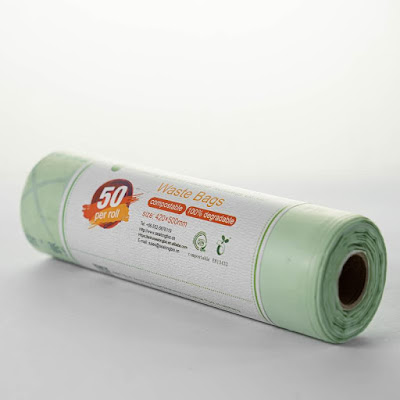Biodegradable Plastic Bags: Healthy Eco- Friendly Alternative
What "Biodegradable" Really Means?
If you're interested in starting an environmentally sustainable business, you'll have to think about whether your products or packaging are biodegradable. For such a common term, though, there is plenty of confusion about what it means.
So, what does it mean for something to be biodegradable? In basic terms, the definition is simple: If something is biodegradable, then, given the right conditions and presence of microorganisms, fungi, or bacteria, it will eventually break down to its basic components and blend back in with the earth. Ideally, but not always, these substances degrade without leaving any toxins behind.
What Materials Are Biodegradable?
Some items are obviously biodegradable. Examples include food scraps and wood that hasn't been treated with chemicals to resist bugs and rot. Many other items, such as paper, also biodegrade relatively easily. Some products will biodegrade eventually, but it may take years. This includes steel products, which eventually will rust through and disintegrate, and some plastics.
However, conditions are important to encourage biodegradability. Products that will biodegrade in nature or in home compost heaps may not biodegrade in landfills, where there's not enough bacteria, light, and water to move the process along.
Biodegradable ≠ Compostable
The term compostable implies that a product breaks down into components or minute particles when it comes in contact with soil or when the product is placed in landfills. Soil essentially works as catalysts and helps the composting process. Compostable products are all biodegradable, but they are specifically intended for a composting environment. Under normal circumstances, the product should breakdown in around 90-180 days resulting into an environment-friendly bio-product that nourishes the soil.
Many organic companies use biodegradable packaging for products or produce organic biodegradable products, but the items may not be as biodegradable as customers think. To make matters more confusing, many items are labeled as "compostable."
These days there are many confusing and conflicting information / products sold with the use of term “biodegradable.” The term “Biodegradable” is used in many confusing contexts. Most of the products that are sold to consumers use terms like earth-friendly, eco-friendly, bio-based, biological and much more without enough evidence or data on how the product is made earth-friendly or biodegradable. Most of the products do not make any claims in terms of what the product decomposes into.
Whether an item is compostable or simply biodegradable, it needs to be placed in an environment that facilitates its breakdown. Compostable products require composting environments. But, even some biodegradable items need to be degraded in a controlled composting environment or facility—and very few of these facilities exist in the United States. These large facilities are designed to keep materials at 140 degrees Fahrenheit for 10 consecutive days.
For example, PLA, a popular biodegradable material for green companies, will only decompose into carbon dioxide and water in a controlled composting environment, not in a backyard composting arrangement, according to standards developed by the Biodegradable Products Institute.
With all of these variables, business owners need to communicate clearly with their customers about what they mean when they say "biodegradable." Even better are those businesses that take it a step further and educate their customers about how to properly dispose of their products.
Many products available in the market do decompose in 12 to 18 months but they decompose into minute particles which humans cannot see and they are dispersed into the air, enters into the food chain, and most of the time we end up eating plastic. This isn’t something worth being thankful for since, in fact, nearly everything will biodegrade in 10,000 years!
Products at Cups & Containers are 100% compostable made with plant fiber, PLA, and CPLA linings will all manure in a couple of months and diminish single-use plastics in landfills. Also, the plant-based fibers and PLAs used in manufacturing are not made from trees. They are made using rotational crops like sugarcane, bamboo, agave, panela, etc. hence meeting requirements of sustainable sourcing.
The significant advantages to the earth are that compostable bundling requires less carbon to create, decreases the measure of waste sent to landfill, and furnishes the earth with life-advancing supplements.
Other important benefits of compostable products for end-users/consumers are:
- You will contribute towards reducing the carbon footprint.
- You will redirect a greater amount of the waste away from earth harming landfills.
- You will make a positive commitment towards diminishing degrees of contamination noticeable all around, groundwater and soil.
- You will assist with moderating assets by decreasing the measure of new/virgin materials expected to make bundling items.
Check out 100% biodegradable plastic products which include Tea&coffee bags, Pet waste bags, shopping bags, Garbage bags, Fruit&vegetable bags, Film, Apron on our website.
We also do custom orders with printed branding or any other design for which you can click here to get in touch with us.






Nice post. Well what can I say is that these is an interesting and very informative topic on biodegradable mailing bags
ReplyDelete